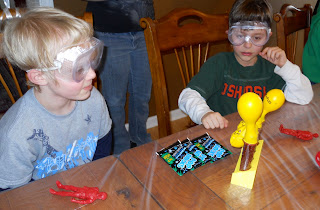This post is an edited, enhanced, and otherwise reworked version of an internal blog post from a class called Motivating 21st Century Learners at Syracuse University. I am posting a series of these because the topics are close to my heart, they illustrate part of my library school journey, and I believe will get you thinking as they did me. If you are a fellow lover of information, community, and life-long learning--or if you are just wondering what we do in library school--welcome!
 |
| Hoping for messy, messy failure. |
There are a few maxims we live by at our house:
- Leave things better than you found them.
- You won't know if you don't try.
- And, thanks to Mythbusters, Failure is always an option.
The last was an important addition because failure is an important step in learning, and we are life-long learners. Teacher librarians would be smart to embrace failure as an option for our students. I'm not suggesting we embrace failing grades, or let students flounder. I am asking that we recognize that failed attempts are learning opportunities. I am asking that we allow time and space in our instruction for re-dos and improvements and even intentional failures. I am asking that we stop giving students one chance to do well, then quickly moving on to the next topic, thus reinforcing the notion that if you can't get things right the first time around, you might as well forget about doing well at all.
How would I do this in a library learning environment? I'm so glad you asked! I would combat fear of failure by including students in setting goals for assignments, placing emphasis on certain assignment elements, making failure a goal for some assignments, and encouraging students to seek out Failure Role Models.
1. Include students in setting goals for assignments to give them a greater sense of ownership in learning and boost their confidence so that they can reach those goals. Use a tool like the KWL (Know-Want to Know-Learned) Chart to help students define what they want to know and create goals from there.
2. Encourage students to focus on one or two elements of a project at one time to increase student confidence in the project's success. This would be appropriate for a project that has already been divided into chunks but may still seem daunting to some students. Let's say they are working on a graphic organizer to record research for an essay. Encourage students to focus on finding facts from reliable resources and remind them that for fact gathering we aren't worried about having perfect writing or spelling, just in recording the facts correctly. Removing the pressure of feeling like their writing in the organizer has to be "perfect” may help relieve that fear of failure enough to make students more receptive to the lesson.
3. Create an assignment in which failure is the goal. My son's after-school STEM class is working on this kind of assignment right now. The students have been tasked to create a bridge that fails. By the time the class has accomplished this task and shared their observations with each other, they will have investigated multiple reasons a bridge could fail. Then, they will attempt building bridges that don't fail.
4. Provide students with examples of people whose successes were built on failed attempts-whether scientists, authors, musicians, artists, etc.. Show students through these examples that most people aren't successful without trying, failing, and trying again. Encourage students to look up articles and to find books about people they admire and find out how long it took them to attain success in or mastery of their field. They could do this as part of a lesson about using resources in the library and share what they learned with the class.
Will my suggestions work? Will they fail? Although these suggestions are grounded in solid theory and based on success I've experienced or seen elsewhere, I will have to try them to find out. One thing is certain--I won't know if I don't try.
No comments:
Post a Comment